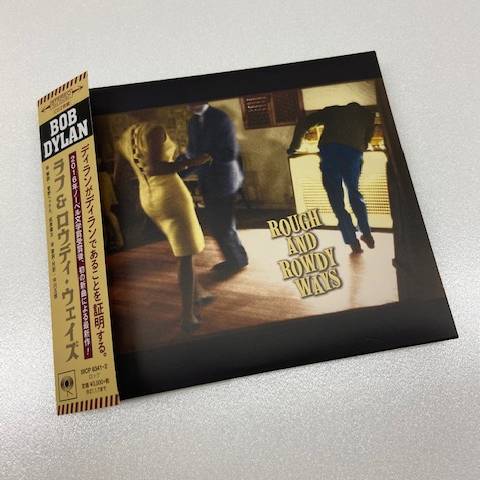MOST READ
- interview with xiexie オルタナティヴ・ロック・バンド、xiexie(シエシエ)が実現する夢物語
- Chip Wickham ──UKジャズ・シーンを支えるひとり、チップ・ウィッカムの日本独自企画盤が登場
- Natalie Beridze - Of Which One Knows | ナタリー・ベリツェ
- 『アンビエントへ、レアグルーヴからの回答』
- interview with Martin Terefe (London Brew) 『ビッチェズ・ブリュー』50周年を祝福するセッション | シャバカ・ハッチングス、ヌバイア・ガルシアら12名による白熱の再解釈
- VINYL GOES AROUND PRESSING ──国内4か所目となるアナログ・レコード・プレス工場が本格稼働、受注・生産を開始
- Loula Yorke - speak, thou vast and venerable head / Loula Yorke - Volta | ルーラ・ヨーク
- interview with Chip Wickham いかにも英国的なモダン・ジャズの労作 | サックス/フルート奏者チップ・ウィッカム、インタヴュー
- interview with salute ハウス・ミュージックはどんどん大きくなる | サルート、インタヴュー
- Kim Gordon and YoshimiO Duo ──キム・ゴードンとYoshimiOによるデュオ・ライヴが実現、山本精一も出演
- Actress - Statik | アクトレス
- Cornelius 30th Anniversary Set - @東京ガーデンシアター
- 小山田米呂
- R.I.P. Damo Suzuki 追悼:ダモ鈴木
- Black Decelerant - Reflections Vol 2: Black Decelerant | ブラック・ディセレラント
- Columns ♯7:雨降りだから(プリンスと)Pファンクでも勉強しよう
- Columns 6月のジャズ Jazz in June 2024
- Terry Riley ——テリー・ライリーの名作「In C」、誕生60年を迎え15年ぶりに演奏
- Mighty Ryeders ──レアグルーヴ史に名高いマイティ・ライダース、オリジナル7インチの発売を記念したTシャツが登場
- Adrian Sherwood presents Dub Sessions 2024 いつまでも見れると思うな、御大ホレス・アンディと偉大なるクリエイション・レベル、エイドリアン・シャーウッドが集結するダブの最強ナイト
Home > Reviews > Album Reviews > Bob Dylan- Rough and Rowdy Ways

5分31秒間、僕は神を信じたことがある。といっても困ったときについ頼んでしまう「神さま」のことじゃない。ユダヤ教とキリスト教で等しく信じられているあの「神」だ。見た目は、ルネサンス期の絵画によれば、カリフラワーライスでダイエット中のサンタ・クロースって感じ。
へんな話だけど、神はポップソングにのってやってきた。僕が11歳のときだ。
ポップソングということは、中学校でのダンスタイムとか、ガソリンスタンドでのトイレ休憩中とかに、スピーカーから流れ出てきた神に出くわしてもおかしくなかったわけだけど、さすがは全知全能の神、きっちり礼拝堂で現れた。
日曜学校でヘブライ語の授業を受けているときの出来事だった。
僕たちは毎回、聖典の重苦しい物語を読まなくちゃならない。それで時々、司祭は教室の雰囲気を盛り立てようとユダヤ系ロッカーの曲をかけてくれた。
この日もラビが1本のカセットテープをラジカセに突っ込み、再生ボタンを押した。流れてきたのは、ボブ・ディランの“ミスター・タンブリン・マン”。
アコギのシンプルなストロークではじまった。DからG、Aと行きDに戻る。
そこへディランの声が重なる。忘れ去られた古の街のこと、そして一夜にして砂へと崩れ落ちた帝国のことを歌いだす。
ディランの詞が僕の脳に、不思議な術をかけたようだ。1番を聴きはじめたとたん、サイケデリックな砂漠文明の光景が目の前に広がった。僕は遠くから、その古代文明が勃興し衰退していく様を早送り再生で眺めている。アリの巣みたい。僕は壮大な物語のジオラマから目が離せなくなった。
なんだか少し怖かった。
でも、ディランの穏やかな声が気分を落ち着かせてくれる──そう思ったのもつかの間、今度は僕の空想が翼を広げて空高く舞い上がっていく。よくあるたとえに聞こえるけれど、実際その通りのことが起きた。“ミスター・タンブリン・マン”の2番と3番の歌詞には、「魔法の渦巻き船(マジック・スワーリング・シップ)」で太陽を目指す旅が出てくる。この詞とともに、僕の心の目はシナゴーグを飛び出し、空を突き抜けて、宇宙まで行ってしまったのだ。
僕はそこでたしかに神の存在を感じた。
最後のコーラスにさしかかる頃には、ディランの“ミスター・タンブリン・マン”がモーセの「割れる海」や「燃える柴」と同じくらい、いや、それ以上の奇跡といえる気がしていた。
ラビが停止ボタンに指をおく。ハーモニカの音がやわらかにフェイドアウトして、曲はおわりを告げていた。
2020年になったいま、僕は先祖代々の信仰を手放して久しいけれど、ディランはハーモニカに奇跡を吹き込みつづけている。最新作『ラフ&ロウディ・ウェイズ』も奇跡のひとつ。このアルバムのなかの曲で、79歳のシンガーソングライターは自身初となるビルボードのシングルチャート1位を獲得した。しかも驚いたことに、この曲は約17分もある。
COVID-19パンデミックのさなかにリリースされたから、聴く側はかつてないほど時間をかけて、自宅でじっくりディランを堪能しているだろう。近年のビルボードヒット曲は、あきらかにどんどん短くなる傾向にあった。2019年の平均は約3分、ディランの大作に比べると6分の1程度だ。
コロナウイルスへの不安とともに生きるなかで、ディランの新しいアルバムに流れるゆったりとした時間は心地よく感じる。ハーブティーみたいに気持ちを落ち着かせてくれる。
だけど穏やかなサウンドとは裏腹に、詞は挑発的で刺激に満ちている。男性器のジョークあり、陰謀論あり、死についてもあり余るほど語られる。みんながよく知る人物も登場する。インディ・ジョーンズ、アンネ・フランク、ジークムント・フロイトにカール・マルクスまで。
ヴォーカルはこのアルバムの要だ。演奏をバックに、歌詞がスポットライトを浴びた名画のように掲げられる。
79歳を迎えたディランの声はひびわれて揺らいでいる。音程補正ソフトが当たり前の時代だからこそ、その魅力はいっそう際立つ。
歌い方もクールだし、年齢を重ねたしゃがれ声と相まって、もはやトム・ウェイツよりもトム・ウェイツっぽい。
昔から変わらない部分もある。本作でもディランは自分が影響を受けたものを見てくれと言わんばかりだ。おなじみのモチーフがときに姿を変えながら、アルバムのあちこちで顔を出す。1940年代のウディ・ガスリーのスタイルに、アパラチア音楽文化の影。グレイト・アメリカン・ソングブックに手を出したかと思えば、アラン・ローマックスの収集音源もちらり。象徴派の詩、自身のフォーク・ソングのロックンロール・アレンジ、それからジャーナリスティックな語り口。もう挙げ出したらきりがない。
『ラフ&ロウディ・ウェイズ』は、傘寿を迎えるディランの輝かしい到達点だ。繰り返し聴きたくなるのはもちろん、底が知れない。あらゆる方向へ広がり、さまざまなものを含みもつ。
ディランはこれまでに何度もポップ・カルチャーの価値をより高みへと更新してきたけれど、今回もそれに成功している。もしも万が一(そうなりませんように!)、本作が最後のアルバムになったとしたら、まさに有終の美というにふさわしい。でも僕はまだまだディランが嬉しい驚きを届けてくれると期待している。2020年のいまも、1964年の頃と変わらず、唯一無二の存在だから。
それに、ディランのような年齢のポップ・アーティストがこんなにも独創的な歌詞を書いているのをみると、すごく励まされる。
僕はもう何十年もディランの文学的な歌詞に心を奪われている。お気に入りの作家や映画監督と同じように、ディランは、未熟な僕が見逃してしまいそうな物事にいつも気づかせてくれる。だから、11歳のときにシナゴーグのラジカセを通じてディランと出会えた僕は、本当に運がいい。
そして、振り返ってみるとちょっと妙な話ではあるけれど、ディランの詞が(ほんの数分間とはいえ)僕に信仰をもたせたというのはちゃんと筋が通っている。だって、結局、歌というのは僕らが神とつながる術なんだから。音楽と無縁な宗教というのは聞いたことがないし、人類史上ずっと、歌うことは霊的な儀式の中心的な役割を担っている。
俗な世界に生きる現代の僕らもいまだに神経言語的なレベルでは、ポップ・ミュージックを宗教的なものに結びつけている。このアルバムには「魂」がある、なんて言ったりするし、ディランみたいなロックスターを「神」と呼んだりもする。
いまだって、僕も心のどこかでディランの詞に神聖なものを感じている。新しいアルバムで聴くあのしゃがれ声には、あらゆるものの解が入っているのだろう。
by Matthew Chozick
For five minutes and thirty-one seconds, I once believed in God. Not just any deity, but the Judeo-Christian one, who, in Renaissance paintings, looks like Santa Claus on a cauliflower rice diet.
Oddly, He came to me in a pop song ― I was eleven.
Although I might’ve found the Almighty in the stereo of a junior high dance or speakered into a gas station bathroom, remarkably, He appeared to me in synagogue.
At the time I was in a Sunday Hebrew school class for children.
Every weekend we kids studied gloomy Torah stories, and sometimes a rabbi would lighten the mood with music from Jewish rockers.
During a lull one Sunday, my rabbi inserted a cassette tape into a boombox, pressed play, and out came Bob Dylan’s “Mr. Tambourine Man.”
It began with simple acoustic guitar chords: D to G to A to D.
Then Dylan started to sing of forgotten ancient streets and of an empire that, in one night, crumbled to sand.
The lyrics did something weird to my brain. The first verse conjured a psychedelic vision of desert civilizations that, from afar, looked like ant colonies. They rose and fell, in time-lapse, on a massive, geological scale.
It was a little scary.
But Dylan’s gentle voice relaxed me ― until it sent my imagination soaring, literally. The second and third verses of “Mr. Tambourine Man” included a journey towards the Sun on a “magic swirling ship.” The lyrics carried my mind’s eye up, out of the synagogue, through the sky, into space.
I felt the presence of God.
By its final chorus, “Mr. Tambourine Man” seemed no less a miracle than the Burning Bush or the parting of the Red Sea.
And then my rabbi readied his finger above the boombox’s stop button, right before the track ended with a soft fadeout of the harmonica.
Now, in 2020, long after I left my ancestral religion behind, Dylan is still packing harmonica with miracles. One such miracle is that the singer-songwriter’s new record, Rough and Rowdy Ways, has given the seventy-nine-year-old his first chart-topping Billboard single ever. And extraordinarily, the hit is some seventeen minutes long.
Released amid our COVID-19 pandemic, listeners have had an unprecedented amount of time at home to parse Dylan. Tellingly, in recent years Billboard hits had been shrinking in size. In 2019 they averaged about three minutes ― roughly 1/6 of Dylan’s 2020 opus.
The new album’s gentle pacing feels soothing in our era of coronavirus anxieties. It relaxes like a cup of herbal tea.
But the record’s sonic mildness belies provocative lyrics. There’s a penis joke, a conspiracy theory, plenty of death, and notable references to Indiana Jones, Anne Frank, Sigmund Freud, and Karl Marx.
The vocals serve as the centerpiece of the album; lyrics hang like spotlit paintings in front of instrumental accompaniments.
Dylan’s voice at seventy-nine cracks and wavers, which makes the record even more compelling in our age of autotune and pitch correction software.
The singing sounds cool; Dylan’s gotten gravellier with age. He’s now more Tom Waits than Tom Waits.
Some things haven’t changed; Dylan still wears his influences on his sleeve. His old muses are reflected and refracted on the new album ― familiar 1940s Woodie Guthrie stylings, Appalachian refrains, forays into the Great American Songbook, hints of Allen Lomax’s field recordings, symbolist poetry, rock n’ roll covers of his own folk music, journalistic storytelling, and oh so much more.
Rough and Rowdy Ways works as a bold culmination of the near-octogenarian’s career. It warrants many relistens and it feels bottomless, expansive. It contains multitudes.
Like Dylan has done time and time again, the new album elevates pop culture orders of magnitude. And if ― knock on wood ― this turns out to be Dylan’s final release, it would be a brilliant note to finish on. Yet I expect more pleasant surprises to come from Dylan. He is still as peerless in 2020 as he was in 1964.
To be sure, it’s heartening to see such lyrical originality from a pop artist of Dylan’s age.
For decades Dylan’s writerly lyrics have captivated me. Like my favorite novelists and filmmakers, Dylan has continually helped me notice things about the world that, in my own stupidity, I would have otherwise missed. So I’m very lucky that, at age eleven, I discovered Dylan in a synagogue boombox.
And while it seems a little weird now, it makes sense that Dylan’s lyrics made me a believer ― if only for a few minutes. After all, good songs are how we communicate with the divine. Every major faith uses music, and singing has been central to spiritual practice throughout human history.
In our secular era today, we’re still neurolinguistically wired to experience pop music as religious. We discuss albums as having “soul” and we refer to rock heroes, like Dylan, as “gods.”
Even now part of me finds Dylan’s songwriting to be divine. His gravelly voice on the new record sounds as if it has all the answers to life’s questions.
マシュー・チョジック/浅倉卓弥・訳
ALBUM REVIEWS
- Loula Yorke - speak, thou vast and venerable head/ Loula Yorke - Volta
- Actress - Statik
- Black Decelerant - Reflections Vol 2: Black Decelerant
- High Llamas - Hey Panda
- The Stalin - Fish Inn - 40th Anniversary Edition -
- KRM & KMRU - Disconnect
- Cornelius - Ethereal Essence
- Kronos Quartet & Friends Meet Sun Ra - Outer Spaceways Incorporated
- Martha Skye Murphy - Um
- Mouchoir Étanche - Le Jazz Homme
- Taylor Deupree - Sti.ll
- John Cale - POPtical Illusion
- Amen Dunes - Death Jokes
- A. G. Cook - Britpop
- James Hoff - Shadows Lifted from Invisible Hands


 DOMMUNE
DOMMUNE



